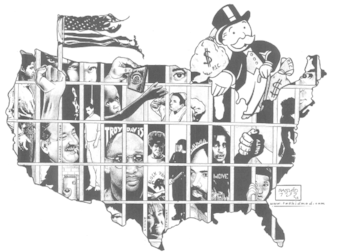I wrote a few weeks ago about a debate in Iowa City over a police budget freeze. In that post, I framed the issues in terms of national debates over ‘defund the police’ and the failure of activist groups to build a majority coalition.
In this post, I’ll apply a local lens. We had a county debate a decade ago on funding for a jail expansion. Local politicians proposed that we build a ‘Justice Center’ to relieve jail overcrowding and other issues. But voters twice rejected the proposal. That old debate provides key insights into the current police budget debate.
The Justice Center
Iowa City is located in Johnson County, by far the most liberal and Democratic county in Iowa. Local liberals proposed the Justice Center in line with local politics, i.e., by centering issues of humane jail conditions. Voters rejected the proposal in 2012 and 2013.
Why did voters reject the proposal? Those opposing the jail expansion made up an odd political alliance, though one that sometimes comes together in Iowa City. In short, it was an alliance of leftists, libertarians, and anti-tax Republicans. They united around the idea that it wasn’t a good idea to write a big check to the criminal justice system. Libertarians laid out various civil liberties concerns, while anti-tax Republicans didn’t want to pay taxes to fund the jail.
Leftists argued that writing a big check to the criminal justice system would end any chance at real reform. Building a bigger jail would provide the system with an incentive to fill it again. In another decade or two, the county sheriff would come back with another request to expand the jail.
The Results
How did it all pan out?
The leftist-libertarian coalition turned out correct on all counts. Denying funds for a jail expansion provided the catalyst needed for real reform. After voters denied funds for the Justice Center, the county addressed the underlying issues that led to overcrowding. And they did so by putting fewer people in jail.
In a span of only 6 years, Johnson County nearly cut its jail population in half. It did so largely by cutting the use of pretrial detention, and it maintained these reforms over time. In short, it did what the left demanded it do.
Did these moves cause a spike in crime? Not at all. There’s no evidence that incarcerating fewer people led to more crime in Johnson County.
Neat trick, right?
Justice Center and Police Budget
I think we can learn some lessons from this that apply to our debate over the police budget in Iowa City. For a city looking for alternatives to policing – and beginning to implement such alternatives – the budget can serve as a useful catalyst for action. Denying funds to the police could force the police to lessen its footprint in a way that ultimately benefits the city’s residents.
Had Johnson County voters approved the Justice Center expansion, these diversion programs never would’ve happened. Why? Because law enforcement doesn’t implement reform without a push to do so. The county criminal justice system wouldn’t have done so without a hard push. Nor will the city criminal justice system.
And one final point to keep in mind – the argument here isn’t that a voter majority came together to deny funds to the county jail. In fact, that’s not how it went down. The approval of funds for a county jail expansion required 60% of the vote. The jail got a majority, but not a 60% one. Rather, the argument here is that jail expansion – and writing big checks to criminal justice and law enforcement in general – was a bad policy move.
You don’t restrict or limit policing by writing big checks to law enforcement. That’s not how it works.
The Uniqueness of Criminal Justice
I’ll end this post by pointing out that this tactic works uniquely for criminal justice funding. Using budget cuts or freezes to effect change doesn’t work everywhere. It shouldn’t even be on the table for most kinds of budget issues.
Why? Why does this work for criminal justice but not, say, libraries or housing funds?
In short, libraries are fundamentally good things. They provide services people need and that we should bolster and expand as much as possible. By contrast, police and jail budgets are reactive ‘solutions.’ A great deal of funding for police expresses our failure to solve issues (e.g., crime, nuisance issues, social services, mental health) by better, more appropriate means.
With policing, we should begin by trying to solve those issues more proactively through better means. A city should think of policing as, at best, a backup for when crime can’t be solved proactively.
These budget scuffles provide the opportunity to think through these issues. And they can provide a catalyst for change.
